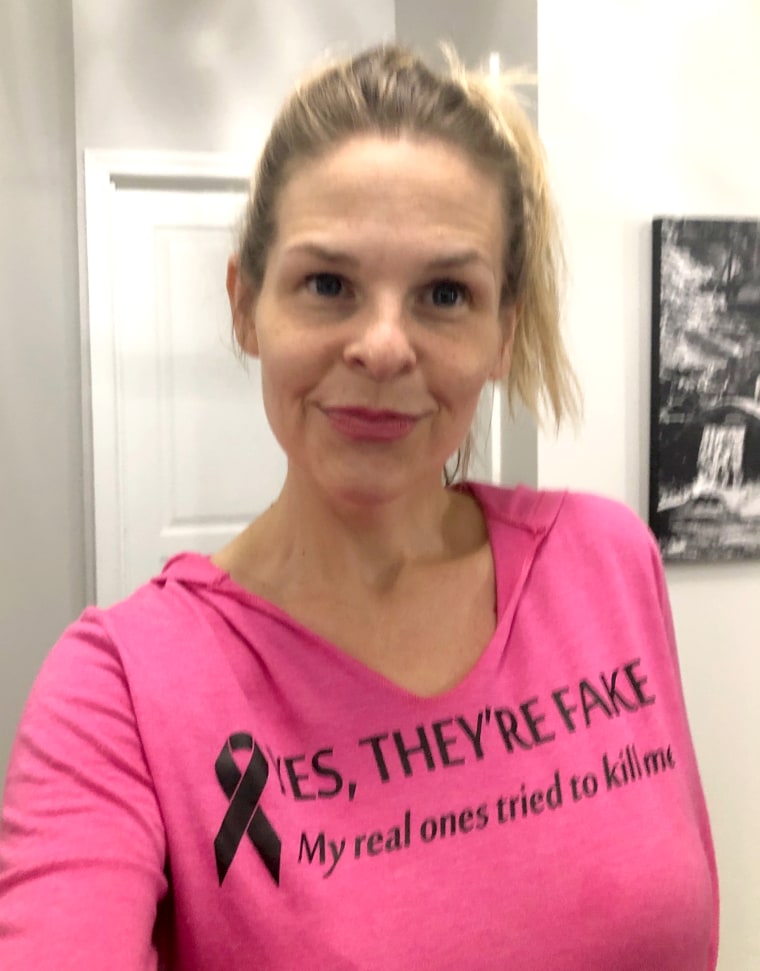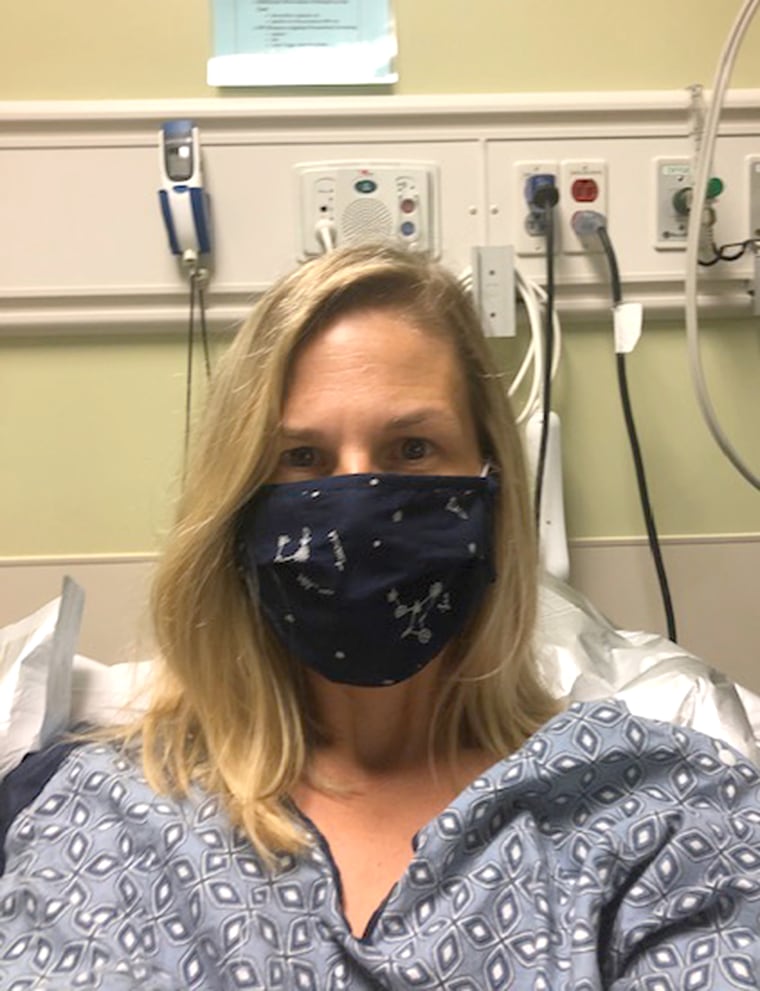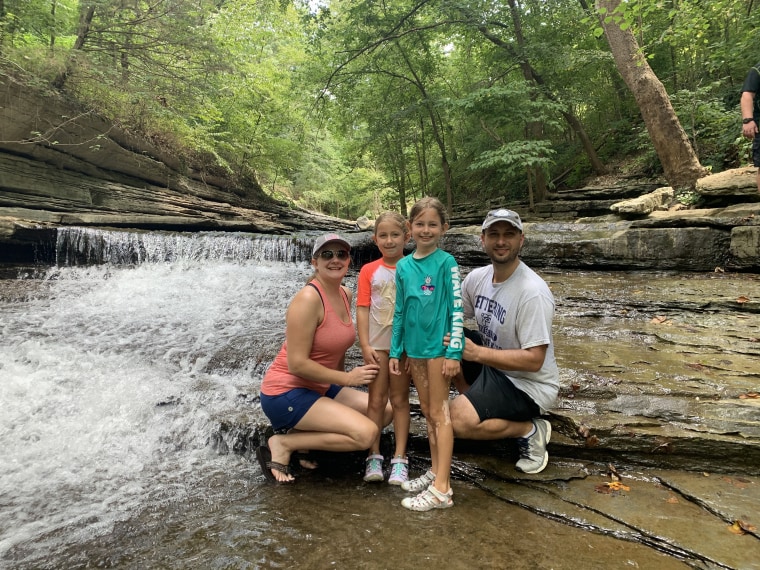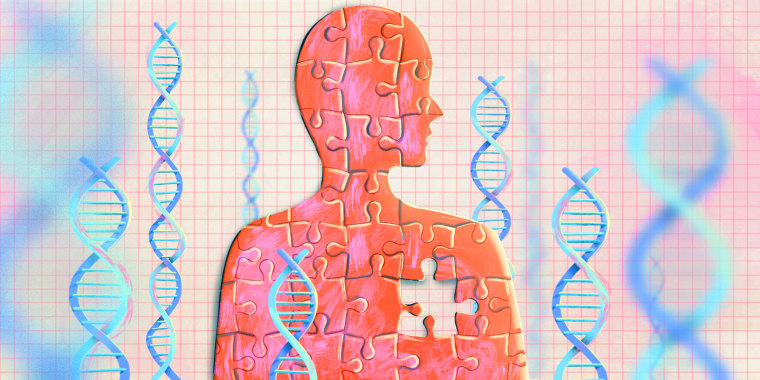Keri Forsythe-Stephens was at home with her young son in Canton, Georgia, about 45 minutes north of Atlanta, when her OB-GYN’s office called and requested an in-person meeting to discuss the results of her recent genetic testing.
“I just thought, ‘I’m dead.’ This was July 2020 and they wouldn’t speak to me virtually. I just knew it was going to be bad,” said Forsythe-Stephens, who was 37 at the time and the mother of two children. She agreed to testing at her doctor’s urging after disclosing that her paternal aunt was diagnosed with breast cancer at age 49.
Five days later, she learned that she tested positive for CHEK2, a gene mutation linked to breast cancer in women. As the editor of a health care magazine, Forsythe-Stephens considered herself well-informed about the cancer risks surrounding BRCA1 and BRCA2 gene mutations, however, “CHEK2 was never discussed,” she said.

Based on her variant of CHEK2 — 1100delC, the most common and aggressive — and family history, Forsythe-Stephens opted to undergo a prophylactic mastectomy three months later. “My OB told me that wasn’t my only choice. I could rotate breast MRI and mammograms every six months, but she told me that, based on my variant and family history, if I wanted to be around for my two kids, it’s the decision I should make. I never hesitated. As soon as I heard that my breasts could kill me, I wanted them off. They felt like a ticking time bomb.”
The post-mastectomy pathology report showed HER2-positive cancer cells, which tend to be aggressive and fast-growing. “My aunt’s cancer was also HER2-positive but she didn’t learn she has CHEK2 until after I did — she was only tested for BRCA before.”

Today, Forsythe-Stephens credits her OB-GYN with saving her life. “I know I would have developed breast cancer. The question is whether that happened after I was 40 and started having mammograms or earlier.”
What is CHEK2?
CHEK2 serves the body as a tumor suppressor, but when it's mutated, it can be linked to numerous cancers. It is considered a more moderate-risk gene mutation.
Today, most people have likely heard of BRCA1, BRCA2 and PALB2 for good reason — they confer a much higher risk of developing breast cancer. Up to 10% of breast cancers are hereditary, harmful BRCA1 and BRCA2 variants are found in 3%-4%; and 1%-2% of those are linked to CHEK2, noted Beth N. Peshkin, the director of genetic counseling at Georgetown Lombardi Comprehensive Cancer Center in Washington, D.C.
In total, there are 11 breast cancer predisposition genes with BRCA1 and BRCA2 carrying the highest risk.
"There are maybe five genes that are considered high-risk genes (when talking about breast cancer) and what that term means is that if you inherit those abnormal genes, then your risk of breast cancer is fivefold higher or more," said Dr. Nadine Tung, an oncologist based in Boston and professor at Harvard Medical School. "That's BRCA1 and BRCA2, PALB2 ... We've certainly known about PALB2 for an almost decade now and have been testing for it. ... Then there are a few other genes that are extremely rare that do have their own pattern of cancers they're associated with. ... We've known about them for a long time, we test for them."
Yet, more moderate-risk gene mutations that confer a 20%-30% lifetime risk, on average, have become more controversial as different studies have reported various findings, said Tung. "In terms of breast cancer, (the moderate-risk genes) are ATM and CHEK2, and the rest we're not so sure about," she said.
"CHEK2 is on people's radar and it's coming on people's radar," said Dr. Judy Garber, an oncologist and the chief of the division for cancer genetics and prevention at Dana Farber Cancer Institute in Boston.
The link between breast cancer and prostate cancer
Women carrying the CHEK2 mutation have a moderate risk for developing breast cancer, ranging from 23%-48% depending on their variant and family history, according to Sara Pirzadeh-Miller, assistant director of the cancer genetics program at UT Southwestern's Harold C. Simmons Comprehensive Cancer Center.
Meanwhile, men with CHEK2 have an increased risk of developing prostate cancer.
Just days after Forsythe-Stephens learned she carried the CHEK2 mutation — which her children stand a 50% chance of inheriting — her father was diagnosed with stage 3 prostate cancer and later learned that he too carries CHEK2.
“Really hardly any of the cancer genes predisposes to only one cancer, and several of them … may have implications for the other gender.”
Dr. Judy Garber
“(Some) women don't realize that a family history of prostate cancer could have implications for them, if the same genes could be involved,” explained Garber. “And then men may think that familial breast cancer is not their problem. It's a woman's problem. Really hardly any of the cancer genes predisposes to only one cancer, and several of them, even the ones you associate with the most sex-specific conditions like prostate cancer or breast cancer or ovarian cancer, may have implications for the other gender.”
Dr. Alison Barron of Texas Breast Specialists similarly noted, “I myself am seeing more and more CHEK2 patients who randomly had genetic testing because of a remote family cancer that’s not breast related.”
CHEK2’s connection to other cancers
More than 2,500 variants of CHEK2 exist, with 270 of those classified as likely or definitely disease-causing, according to Dr. David Euhus, professor of surgery and oncology at the Johns Hopkins University School of Medicine in Baltimore, Maryland. The1100delC variant carries a 24% probability of a woman developing breast cancer in her lifetime, before considering her family history.
In addition to breast and prostate cancers, some experts believe CHEK2 may have a possible association to the following cancers to varying degrees: kidney, colon, thyroid and skin.
Dr. Phillip Ley, a Mississippi-based surgical oncologist specializing in breast cancer, discovered he carries CHEK2’s 1100delC variant after being diagnosed with stage 1 kidney cancer. “(My variant is present in) 0.1% to 0.2% of people of Northern European descent,” Ley explained. “Think about how many people that is. That’s 1 in 1,000. That’s fairly ubiquitous.” In his family, one of his two daughters carries the gene mutation, as well as his brother. His father was diagnosed with prostate cancer at 72.
In addition to breast and prostate cancers, some experts believe CHEK2 may have a possible association to the following cancers to varying degrees: kidney, colon, thyroid and skin. Suggested preventative screenings for these, such as increasing the frequency of colonoscopies to every three to five years, should be discussed with medical professionals on a case-by-case basis.
“It’s important to emphasize that while patients with different cancer types may have been found to have a mutation in CHEK2, that does not necessarily mean their cancer was driven by that mutation. This is due to the fact that CHEK2 is considered to be a medium-risk gene, and can be an incidental finding,” said Dr. Alicia Latham, assistant attending physician and medical geneticist at Memorial Sloan Kettering Cancer Center in New York City. “It is also important to remember that our knowledge about CHEK2 and its associated cancers may continue to be refined over time as more people have genetic testing and more data is accumulated.”

Emily Przybyla, of Keller, Texas, was in her mid-30s and had never had cancer — though many close relatives did — when she learned that she carries the CHEK2 mutation. “At the time I was an employee of Texas Oncology. (After) talking with a nurse practitioner there regarding my family history of many types of cancers, she suggested I have the testing. It is a fairly simple process.”
Now, at 40, her screenings include yearly diagnostic mammograms plus monthly breast exams, annual skin checks with a dermatologist and a colonoscopy every three years. “Managing and screening is easy. It’s fighting cancer that is not,” said the mother of two daughters. “I would rather get a colonoscopy every three years and have polyps removed (than have) colon cancer, or go to a mammogram yearly than fight breast cancer. I stay on top of my health because I want to be around for a long time to see my kids grow up.”
Who should receive genetic testing for CHEK2?
While organizations’ guidelines for determining who should seek genetic testing may differ, criteria doctors may consider include a family history of cancers and ages at onset, a patient’s age at diagnosis, as well as the type of cancer. “My own opinion is that everyone should be informed about it and make their own decision,” Euhus said.
Euhus offers testing for all breast cancer predisposition genes to all of his breast cancer patients. Sites like Color and Invitae also offer convenient and affordable genetic testing options, with panels searching for numerous mutations costing approximately $100-$300 or less if billed through insurance.
“If a person has not had cancer — but has a strong family history, especially in close relatives — the patient, or if possible, their relatives with cancer histories should consider genetic testing,” said Peshkin, who also emphasized the importance of consulting a genetic counselor both before and after testing as variants and family history play a critical role in accessing risk.
We are lucky to live in a time when we can be proactive, rather than reactive, with our health."
Keri Forsythe-Stephens
“(Counselors can) help patients make informed decisions, ensure they receive appropriate and up-to-date recommendations, educate them about risks to relatives, and provide support.”
Patients can also follow up with counselors every few years to inquire about advancement in testing that relates to them.
The National Society of Genetic Counselors’ website provides a directory for finding genetic counselors, with both in-person and virtual appointment options. Prior to genetic testing, your counselor should address how discovering a hereditary mutation can affect your eligibility for life insurance, disability insurance and long-term care insurance. “The federal law, GINA, the Genetic Information Nondiscrimination Act of 2008, does not protect against denial of insurance in these markets. However, many states have enacted additional protections,” Peshkin explained. “It appears that discrimination in these insurance markets due solely to a hereditary cancer risk is rare. Nevertheless, it is important to investigate these protections prior to being tested.”
Breast cancer management options for CHEK2 carriers
“CHEK2 is a little bit complicated,” explained Garber. “It doesn’t confer as high a risk (as BRCA1 or BRCA2) — and that’s a good thing. … When you have a gene that gives less risk, you have to be more balanced thinking about how do you manage this?”
Garber stressed that guidance is evolving regarding CHEK2 management, but newer guidelines suggest that doctors shouldn’t start (screening) until 40, though every patient is different.
“The problem is the false positives that lead to more imaging tests, more biopsies and sometimes unnecessary surgery. That is why you really need to reach a certain risk level before you start recommending screening,” Euhus explained.
Women with a high-risk variant plus a strong family history may consider a prophylactic mastectomy. “That’s a very individual decision,” Garber said. “We would hope that for the majority of women there are other ways to manage the risk like careful monitoring and maybe medication to lower risk.”
Monitoring may include rotating breast MRIs and mammograms every six months. “It is reasonable to consider taking tamoxifen or another anti-estrogen medicine to reduce your breast cancer risk if you are a CHEK2 carrier,” Euhus added.
"I don't think individuals should be fearful of genetic testing," stressed Tung. "We should do it when it's appropriate, and we should see it as empowering, but we should use our genetic experts, when there is a finding, to make sure that it's interpreted properly, and so that proper recommendations can be made."
It’s been nearly a year since Forsythe-Stephens’ prophylactic mastectomy last October and she has no regrets about her decision.
“We are lucky to live in a time when we can be proactive, rather than reactive, with our health. Make informed decisions and talk to your doctor about your risk level based on your particular variant and family history. ... Knowledge is power — so make the best decision for you and your family.”




